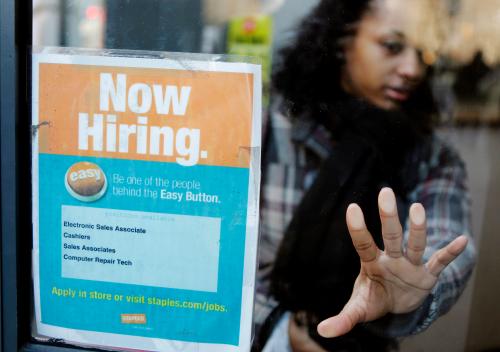Before we get too far into back-to-school season, let’s take a moment to look back at the summer. As I’ve written before, summer jobs programs can provide young people with valuable work experience that equips them for future success in the labor market – particularly important in a time of declining employment among teens and young adults. It’s one thing to cite articles about the benefits of youth employment, but it’s another to hear directly from young people about how summer jobs programs affected them.
With that in mind, I spoke with two young people, Oswego and Ana, who participated in the Marion Barry Summer Youth Employment Program here in D.C. Oswego, now a senior in high school, worked for the past two summers at Brainfood, a youth development organization that uses food, cooking, and gardening to help teens develop leadership and life skills. (He mentioned a recipe for broccoli pesto that I need to follow up on, and also that he learned how to chiffonade and make rouille. I had to Google those terms to find out what they mean, so I’d say he’s got some serious culinary credibility.) Ana, a recent high school graduate, is entering college this fall. She worked for the past four summers as a camp counselor for DC SCORES, a youth development program that integrates soccer, poetry, and service-learning to build the skills, confidence, and leadership of elementary and middle-school students.
What did these young people gain from their summer jobs? From Oswego: “I [learned] how to be not so awkward. I used to be pretty awkward with adults… I like that I got to grow in that sense.” With admirable brevity and clarity, Oswego just described the process of learning what we might label “soft skills.” And here’s an example of building social capital and networks: While making cookies, he talked with staff and learned about their culinary training, such as the schools they attended and the tuition, which helped solidify his desire to attend the Culinary Institute of America after graduating from high school. Through the guest chefs who came to Brainfood’s associated afterschool program, he met the head chef at a prominent restaurant who gave him his card and said to call him with any questions.
Ana also recounted how her experience with DC SCORES made her more comfortable speaking with adults, since she took on the role of explaining the program to Spanish-speaking parents (she is bilingual). Refereeing soccer games, leading writing workshops, and chaperoning field trips also made her more confident in her leadership and communication skills. Her interviews with DC SCORES staff to become a camp counselor after graduating from the afterschool program helped her prepare for future job interviews. As she noted, “[T]here is a point that you are going into the real world. This is just a program.” She also highlighted the importance of mentoring: she has seen that positive relationships with adults can “pull someone back in from a bad path.”
Notably, before starting their summer jobs, Oswego and Ana participated in afterschool programs at Brainfood and DC SCORES, respectively. Their longer-term participation no doubt amplified the summer program’s effects, since it allowed the organizations to structure their summer jobs to capitalize on the skills and relationships the teens had built up over time. This is not to say that every successful summer jobs experience needs to link to a school-year or year-round program—in any case, there are probably not enough of these longer-term programs to absorb every summer jobs participant—but in Ana and Oswego’s cases, their school-year experiences paved the way for success in their summer jobs.
In the end, summer jobs helped these young people develop the confidence, skills, and knowledge that are critical to navigating the sometimes-rocky road to adulthood. While Ana and Oswego don’t speak for all young adults, their experiences highlight how youth employment programs can make a positive difference in a teenager’s life.





Commentary
Soft skills and networking: Not just fringe benefits of youth employment programs
September 19, 2016